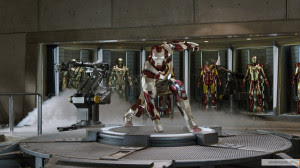
"LOST" RETROSPECT: (2.11) "The Hunting Party"
I may be a bit picky about my tastes in television viewing. But I must admit there have been a few television episodes either dismissed or lambasted by critics and fans alike, but which I have come to like. One of those episodes is the Season Two episode of "LOST" called (2.11) "The Hunting Party".
This eleventh episode from the series' second season picks up not long after the previous episode, (2.10) "The 23rd Psalms" left off. In the previous episode, Michael Dawson believed he had managed to contact his kidnapped son Walt Lloyd, while using the twenty year-old computer inside the DHARMA Swan Station. He also recruited the help of fellow castaway, John Locke, to teach him how to use a rifle. When "The Hunting Party" began, Dr. Jack Shephard found an unconscious Locke on the floor of the station's armory. Before he could do anything, Michael appeared with a gun trained on Jack and in a desperate tone, revealed his intentions to find Walt. Michael forced Jack to remain by Locke's side, before locking both of them inside the armory. When other castaways Kate Austen and James "Sawyer" Ford go to the station to have the latter's bandages changed, they free both Jack and Locke. Jack immediately reaches for a rifle and state his intentions to find Michael and bring him back. Both Locke and Sawyer volunteer to join him. Kate also volunteers, but Jack curtly orders her to remain behind and be ready to punch in the numbers for the station's computer. The three men leave without her. Despite Jack's refusal of her help, Kate recruits Hugo "Hurley" Reyes and Charlie Pace to monitor the station's computer for her, while she heads out into the jungle to join the hunting party.
The episode's flashbacks start with Jack and his father, Dr. Christian Shephard, diagnose a middle-aged Italian man with a spinal tumor named Angelo Busconi. The two Shephard surgeons inform Signor Busconi and his daughter, Gabriela that his tumor is too far gone and that he is not eligible for surgery. However, Signor Busconi and Gabriela insist that they are interested in recruiting Jack's help. They had learned of the miracle he had achieved after performing surgery on his wife, Sarah Shephard, before their marriage. Much to Christian's dismay, Jack agrees to perform the surgery on Signor Busconi. The older surgeon also notices the attraction between Jack and Gabriela. And Jack also continues spending more time at the hospital, either ignoring or evading Sarah's company at home.
Despite the opinions of other "LOST" fans and critics, I have always liked "The Hunting Party". I found the plot regarding the Losties' hunt for Michael very interesting. And believe it or not, I rather enjoyed the flashbacks regarding Jack's attempt to save Angelo Busconi and his troubling marriage to Sarah. But for the likes of me, I have always had difficulty making the connection between the on-island plot and the flashbacks. Exactly what is the connection? Was Jack's difficulties in his relationship with Kate and her attraction to Sawyer a reminder of Sarah's infidelity and the end of his marriage? Was his decision to embark upon a near impossible task - finding Michael and bringing him back - similar to his decision to accept Signor Busconi as a patient? Did I hit the mark regarding the episode's main plot . . . or what? After eight years, I am still confused.
But I still like "The Hunting Party" . . . very much. It is one of my favorite Jack-centric episodes. The hunt for Michael showcased an aspect of Jack's personality that has been problematic - his inability to let go. The problem with Jack was he lacked a real instinct on whether to give up on an impossible task, or to continue it. On one hand, he never realized that Locke was right about letting Michael go. The choice to leave the Losties' camp and go after Walt was up to Michael, not Jack or any of the other castaways. I think Jack took his "live together, die alone" mantra a bit too far in his determination to get Michael back. However, it seemed a pity that he and the other Losties never extended that mantra to Walt. In the case of the flashbacks, I suspect that the Busconis' stroking of Jack's ego led him to accept Angelo Busconi as a patient. Even though the Italian father and daughter were grateful toward Jack's willingness to take a chance on the former, I cannot help but wonder if that was a chance Jack should have ignored.
Both the on-island plot and the flashbacks also featured Jack's problematic relationships with the two women in his life. Two episodes ago in (2.09) "What Kate Did", Sawyer unconsciously expressed his love for Kate, while Jack was tending him. This bedside confession conjured feelings of jealousy within Jack, who must have recalled the kiss that Sawyer and Kate had exchanged in the Season One episode, (1.08) "Confidence Man". In "What Kate Did", Kate kissed Jack in a confusing moment and ran off into the jungle in tears. Between her action and Sawyer's confession, I suspect Jack found himself wondering if Kate ever loved him. This so-called "love triangle" must have reminded him of his previous marriage. The problems in Jack's relationship with Sarah proved to be more straightforward. Flashbacks in an earlier Season Two episode called (2.01) "Man of Faith, Man of Science" revealed how Jack and Sarah first met - she was a victim of a car accident that eventually killed Shannon Rutherford's father, and Jack was the surgeon that prevented her from becoming physically disabled. In the Season One episode, (1.20) "Do No Harm", flashbacks revealed that some time after Jack's successful surgery on Sarah, they got married. I never understood why those two had married. Was it gratitude on Sarah's part? Had Jack been caught up in the emotional relief over saving her? Who knows. But the flashbacks in this episode revealed that their marriage had slowly deteriorated to the point that it led to Jack spending most of his time at the hospital . . . and Sarah committing adultery and later, leaving him. Some fans had complained about the quiet manner in which their marriage had ended, despite the erotic moment between Jack and Gabriela Busconi. Actually, I found it very realistic . . . and very common among relationships.
There were other aspects of the episode I found interesting. Locke revealed to Sawyer and television viewers, the latter's real name - James Ford. This revelation proved to be a mild shock, considering that viewers had already learned back in Season One that Sawyer was an alias. This episode also saw the return of the "Bearded Man" aka Tom Friendly, who had kidnapped Walt in (1.24-1.25) "Exodus". Tom and his fellow Others had trapped the hunting party before convincing them (actually through coercion) to return to their camp. Not only did the Losties' encounter with Tom provided another bump in the road for Jack and Kate's relationship; it also reminded viewers that Sawyer blamed Tom for shooting him (one of the members of Tom's party had shot him, when he reached for his gun). For the first time, Sawyer declared his intentions to seek revenge for what happened to him, proving that of all the series' characters, he was a master at combining revenge with murder in order to alleviate his pain. There was one aspect of this episode that I found . . . perplexing. Throughout most of the episode, Locke questioned Jack's decision to go after Michael, spouting free will as an excuse. And yet . . . he had decided to accompany Jack on this expedition, anyway. Locke was also not above enforcing his own will upon others. So, why did he join this hunting party in the first place? Even the state of the Kwons' marriage ended up affected by Jack's hunting party. When Jin learned about Michael's flight into the jungle, he considered joining the hunting party, until Sun stopped him. For the first time, Sun truly got her way since the beginning of the series. In a marvelous scene, she put her foot down and revealed her opposition to Jin's intentions. She also revealed how she had felt about his past controlling behavior toward her. The Kwons' marriage took a new step above the resentments, anger and lies that marred their relationship in the past.
"The Hunting Party" featured some solid performances from cast members such as Terry O'Quinn, Josh Holloway, Evangeline Lilly and Naveen Andrews; and guest stars that included Julie Bowen, Ronald Guttman, Monica Dean and M.C. Gainey. But in my opinion, the best performances came from guest star John Terry, Harold Perrineau, and especially, Matthew Fox. It seemed a pity that Perrineau never received any nominations for his outstanding work. And I find it laughable that Fox had to wait another four seasons before the Hollywood community was even willing to nominate him for his work on "LOST". But if many of us are truly honest with ourselves, acting and production awards are usually based upon popularity contests, not upon any worthy endeavors.
I wish I could say that I consider "The Hunting Party" to be one of the best episodes that aired on "LOST". The narrative written by Elizabeth Saranoff and Christina M. Kim allowed for strong characterizations and some interesting subplots. Unfortunately, I found the connection between the on-island plot and the flashbacks rather weak. Even worse, the episode ended with Jack proposing to Tail Section survivor Ana-Lucia Cortez that they create an army to deal with the Others. And this potential subplot never went anywhere, in the end.


























